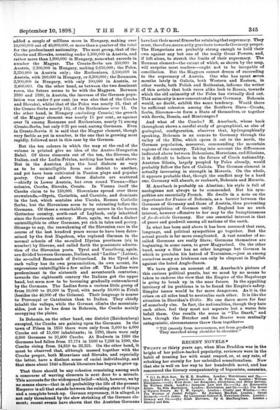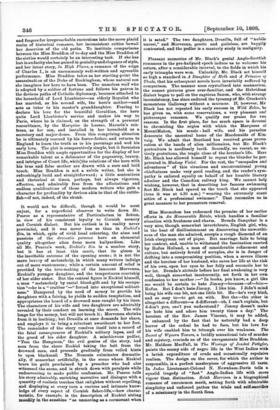RECENT NOVELS.* TWENTY or thirty years ago, when Miss Braddon
was in the height of her yellow-backed popularity, reviewers were in the habit of treating her with scant respect, or, at any rate, of rebuking her sternly for her unbridled sensationalism. Now that she is well on her way to her hundredth novel, and has renounced the literary companionship of bigamists, assassins,
• (1.) In High Seas. By M. E. Braddon. London : Hutchinson and Oa— (2.) Estries Sin: a CorniA Romance. By J. H. Pearce. London : William Heinemann.—(S.) Wild Bolin : her Bwapades, Adventures, and Bitter Sorrows. By William Black. London: Sampson Low and Co.—(4..) An Honourable Estate. By Ella Macmahon. London: Hutchinson and Co.---(5.) The Secret of Wyvern Towers. By T. W. Speight. London : Chatto and Windus.—(6.) The Wooinys of Jezebel Pettyfer. By Baldane MacFall. London Grant Richards.—(7.) Jades. By Lieutenant-Colonel N. Newnham-Daria. London : Downey and Co.—(3.) Selah Harrima. By B. hisoNaughtan. London s Bentley and Son.
and forgers for irreproachable excursions into the more placid realm of historical romance, her inconsistent critics bewail her desertion of the old paths. To institute comparisons between the Miss Braddon of to-day and the Miss Braddon of the sixties would certainly be an interesting task. If she has lost in audacity she has gained in geniality and elegance of style, and her latest story, In High Plates, a romance of the reign of Charles I, is an uncommonly well-written and agreeable performance. Miss Braddon takes as her starting-point the assassination of the Duke of Buckingham, whose natural son she imagines her hero to have been. The nameless waif who is adopted by a soldier of fortune and follows his patron in the devious paths of Catholic diplomacy, becomes attached to the household of Lord Llanbister—an elderly Royalist who has married, as his second wife, the hero's mother—and acts as tutor to his master's granddaughter. Fearing to declare his love for the beautiful Geraldine, the hero quits Lord Llanbister'a service and makes his way to Paris, where he is claimed, on the strength of a personal resemblance, by the Marquise de Lussac, Mazarin's mis- tress, as her eon, and installed in her household as a secretary and major-domo. From this comprising situation he is ultimately rescued by his foster-father, and returns to England to learn the truth as to his parentage and wed his early love. The plot is comparatively simple, but it furnishes Miss Braddon with ample opportunities for the display of her remarkable talent as a delineator of the pageantry, luxury, and intrigue of Court life, while:the relations of the hero with his true and false mother are drawn with a sure and bold touch. Miss Braddon is not a subtle writer, but she is refreshingly lucid and straightforward ; a little sententious and rhetorical at times, perhaps, but always vigorous, effective, and admirably free from the affectations and endless qualifications of those modern writers who gain a character for profundity by devices akin to that of the cattle- ash—if not, indeed, of the skunk.
It would not be difficult, though it would be most unjust, for a superficial observer to write down Mr. Pearce as a representative of Particularism in fiction, in view of his consistent loyalty to Cornish scenery and Cornish dialect. But his outlook is in reality never provincial, and it was never less so than in Ezekiel's Sin, in which, spite of vivid local colouring, the aims and passions of the dramatis personx have an elemental quality altogether alien from mere kailyardism. Like all Mr. Pearce's work, Ezekiel's Sin is a sombre story, but it has at least this merit, that its gloom is the inevitable outcome of the opening scene ; it is not the mere luxury of melancholy, in which many writers indulge out of mere wantonness ; while a certain amount of relief is provided by the love-making of the innocent Morvenna, Ezekiel's younger daughter, and the tempestuous courtship of her elder sister. But the central figure is Ezekiel himself, a man "melancholy by racial blood-gift and by his occupa- tion "—he is a "crabber "—" forced into exceptional solitari- ness." Hampered by the need of money to provide his daughters with a fairing, he yields to sudden temptation, and appropriates the hoard of a drowned man caught by his lines. The characters of his wife and two daughters are admirably revealed by their conduct on learning the secret. The wife longs for the money, but will not touch it ; Morvenna shrinks from it in loathing; but Drusilla at once demands her share, and employs it to bring a reluctant sweetheart to her feet. The remainder of the story resolves itself into a record of the fatal consequences of Ezekiel's solitary lapse, and of the greed of his elder daughter. A mischievous pedlar, "Tom the Hangman," the evil genius of the story, had seen from the shore Ezekiel taking the belt from the drowned man, and proceeds gradually from veiled hints to open blackmail. The Nemesis culminates dramatic- ally, if somewhat artificially, in the scene where Ezekiel hears his guilt proclaimed by a preacher who had also witnessed the scene, and is struck down with paralysis while endeavouring to make public confession. Mr. Pearce tells his story admirably, enriching narrative and dialogue with a quantity of realistic touches that enlighten without repelling, and displaying at every turn a curious and intimate know- ledge of every aspect of Cornish fisher-life,—how charac- teristic, for example, is the description of Ezekiel sitting moodily in the sunshine "as unmoving as a cormorant when
it is sated." The two daughters, Drusilla, full of "nubile unrest," and Morvenna, gentle and guileless, are happily contrasted, and the pedlar is a masterly study in malignity.
Pleasant memories of Mr. Black's genial Anglo-Scottish romances in the pre-kailyard epoch induce us to welcome his return, after a considerable interval, to the fields in which his early triumphs were won. Unluckily, Mr. Black set himself so high a standard in A Daughter of Heth and A Princess oj Thule, that his subsequent novels have invariably suffered by comparison. The manner soon crystallised into mannerism, the sunset pictures grew over-familiar, and the Hebridean dialect began to pall on the captious Saxon, who, with strange inconsistency, has since endured the tyranny of Mr. Crockett't momentous Galloway without a murmur. If, however, Mr Black has not repeated his early success in Wild Eelin, has given us, with some reservations, a very pleasant and picturesque romance. We qualify our praise for twc reasons. In the first place, far too much space is devoted to chronicling the orgies with which the Marquess of MountMahon, his music - hall wife, and his parasite' desecrate the ancestral home of the Macdonalds of Kin- vaig. We admit that Scotland has received gross provo. cation at the hands of alien millionaires, but Mr. Black's portraiture is needlessly lurid. Secondly, we resent, as en- tirely gratuitous, the tragic close of the heroine's life. Here Mr. Black has allowed himself to repeat the blunder he per- petrated in Madcap Violet. For the rest, the "escapades and adventures" of this vivacious and unconventional young chieftainess make very good reading, and the reader's sym- pathy is enlisted equally on behalf of her humble literary admirer and the Canadian railway king. We cannot help wishing, however, that in describing her famous swimming feat Mr. Black had spared us the touch that she appeared (true it was at 4.30 a.m.) "wearing the extremely scant attire of a professional swimmer." That reconciles us in great measure to her premature removal.
Miss Macmahon has redeemed the promise of her earlier efforts in An Honourable Estate, which handles a familiar situation with freshness and charm. Brenda Sanquhar is a very nice, though somewhat invertebrate, English girl, who, in the heat of disillusionment on discovering the unworthi- ness of the man she admired, accepts a rough diamond of an Irish clergyman out of pique. But marriage fails to bring her content, and, unable to withstand the fascination exerted by Rufus Holland, a man of considerable refinement and culture, but entirely ievaid of scruples, she is in danger of drifting into a compromising position, when a severe illness and the heroism of her husband, who saves her life at the risk of his own, open her eyes to her folly and reconcile her to her lot. Brenda's attitude before her final awakening is very well, though somewhat incoherently, set forth in her own confession to her mother :—" In books, you know, a girl like me would be certain to hate Jimmy—because—of—hiss- Ruf us. But I don't hate Jimmy. I like him. I didn't mind being his wife one bit, not one little bit. He—he's very kind, and so easy to—to get on with. But the—the other is altogether a different—a d-different—oh, I can't explain, but d-don't you, can't you understand ? Jimmy doesn't make me hate him and adore him twenty times a day." The heroism of the Rev. James Vincent, it may be added, is enhanced by the fact that he naturally had a deep horror of the ordeal he had to face, but his love for his wife enabled him to triumph over his weakness. The Secret of Wyrern Towers, a luridly sensational tale of murder and mystery, reminds us of the unregenerate Miss Braddon. Mr. Haldane MacFall, in The Wooings of ,Tezebel Pettyfer, paints the seamy side of negro life in the West Indies with a lavish expenditure of crude and occasionally repulsive realism. The design on the cover, for which the author is responsible, is a perfect masterpiece of aggressive ill taste. In Jadoo Lieutenant-Colonel N. Newnham-Davis tells a squalid tragedy of "fast" Anglo-Indian life with more vigour than distinction. Selah Harrison is a biographical romance of uncommon merit, setting forth with admirable simplicity and unforced pathos the trials and self-sacrifice of a missionary in the South Seas.



































 Previous page
Previous page